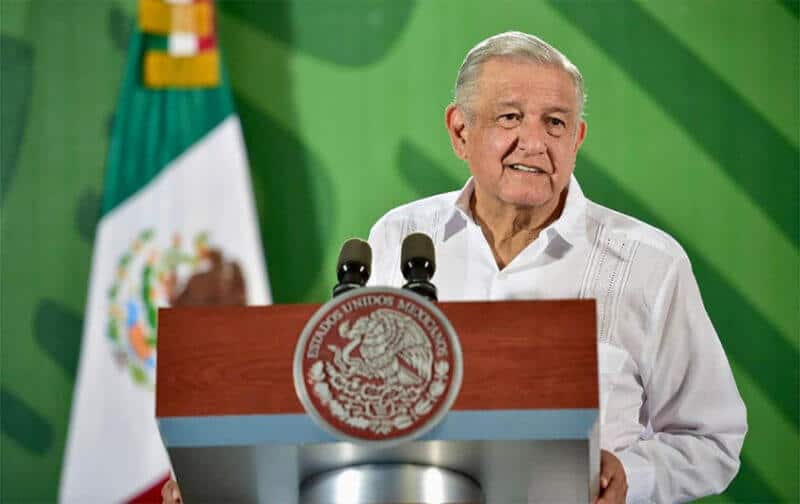Carbon emissions and power generation costs will both increase substantially if President López Obrador’s proposed electricity reform passes Congress, according to a United States government agency.
Sent to Congress at the start of October, the constitutional bill would guarantee 54% of the power market to the state-owned Federal Electricity Commission (CFE).
The National Renewable Energy Laboratory (NREL), a division of the U.S. Department of Energy, said in a report that giving the CFE a bigger share of the electricity market – the company says it currently holds 38% – would cause a decline in the use of energy generated at Mexico’s wind and solar farms.
As a result, Mexico’s emissions would increase between 26% and 65% and electricity generation costs would rise between 32% and 54%, the NREL said.
A draft of the agency’s study seen by Bloomberg News said the electricity reform “could potentially distort the principle of economic dispatch, increasing production costs, and threatening the country’s short-term climate change commitments.”
Mexico has pledged to reduce greenhouse emissions by 22% by 2030. But the NREL’s study said that emissions “significantly increase under all scenarios” if the electricity reform is approved by Congress.
Before sending the bill, López Obrador took several steps to increase state control over the energy sector.
An Energy Ministry policy published in May 2020 imposed restrictive measures on the renewable energy sector but was suspended the following month by the Supreme Court, which ruled that it violated constitutionally enshrined principles of free competition. The court definitively struck down 22 provisions of the same policy in February.
More recently, the Energy Regulatory Commission shut down three privately owned fuel storage terminals in a move that will likely benefit Pemex, the state-owned oil company.
“The government wants to return to a gasoline monopoly,” said energy sector sources cited by the newspaper Reforma.
The NREL’s findings were rejected by López Obrador at his regular news conference on Thursday.
“With all respect they don’t have information about what is being done in Mexico,” he said.
Asked explicitly whether it is false that carbon emissions and power generation costs will go up, the president responded:
“It’s false, false, false and it doesn’t sound logical, it sounds metallic. What doesn’t sound logical sounds metallic.”
López Obrador said the aim of his reform is to “put order” to the electricity sector.
“Among other things politics was invented to put order to chaos and to avoid war. What we’re going to do is put the electricity market in order,” he said.
“… If this disorder, this chaos, continues, then we could have blackout problems and above all increases in the cost of electricity,” López Obrador said.

The NREL’s findings were also dismissed by a CFE director who spoke with Bloomberg. Mario Morales Vielmas, director of intermediation of legacy contracts, said the CFE doesn’t expect any increases in power generation costs or higher emissions if the electricity form passes Congress.
He also said the CFE would have ample capacity to meet customers’ energy needs if the reform is passed and its market share is increased. “We see clearly that it’s a benefit for all,” Morales said.
The reform won’t force private companies out of the electricity market but it will level the playing field, according to the state-owned firm.
However, the reform would revoke existing power generation permits. It would also give national grid priority to energy produced at CFE’s aging hydroelectricity plants, which the federal government plans to modernize.
Power generated at CFE’s nuclear and gas-fired plants – which also burn fuel oil, a highly contaminating energy source – would also be above privately produced electricity in the national grid pecking order. Power generated by private companies using renewable sources such as wind and solar would be close to the bottom of the list, just above privately generated fossil-fuel power.
Montserrat Ramiro, former head of the Energy Regulatory Commission, said the CFE would have majority control of the electricity market, and be the sole purchaser of privately generated electricity as well as the only power retailer.
Therefore, there would be a monopsony in the electricity market and the CFE would be able to determine the prices it pays for the power it buys from suppliers and the conditions under which it makes those purchases, Ramiro said.
Having only one power retailer would be dangerous because the CFE could decide not to sell electricity to businesses that were exercising some kind of political pressure and continually complaining about service, he said.
The CFE could switch off the lights in an entire state or industry, Ramiro warned.
Óscar Ocampo, energy coordinator at the Mexican Institute for Competitiveness, a think tank, said the reform would increase electricity prices and the prices of other products would increase as a result.
Unsurprisingly, private and foreign energy companies that operate in Mexico are concerned about the proposed reform. The Canadian Chamber of Commerce in Mexico said earlier this month that the reform will have “dire consequences” if approved by Congress, asserting that it will destroy investments of Canadian companies in the electricity sector and other areas of the economy.
However, there is no guarantee that the bill will get through Congress as constitutional reforms require two-thirds support. The ruling Morena party lost its lower house supermajority after elections earlier this year and has never had a supermajority in the Senate.
López Obrador said earlier this month that the government will attempt to convince all opposition political parties to support the reform – with the Institutional Revolutionary Party a particular target – but none has indicated they will.
In addition to predicting higher emissions and electricity generation costs, the NREL said the reform could increase the probability of blackouts by 8% to 35%. It used Mexican power system generation data from September 2020 to August 2021 to complete its study, which was conducted on behalf of the 21st Century Power Partnership, an initiative of the Clean Energy Ministerial, a high-level global forum to promote policies and programs that advance clean energy technology.
Bloomberg noted that the study took into account production costs, emissions and system reliability to generate various scenarios under the proposed reform.
